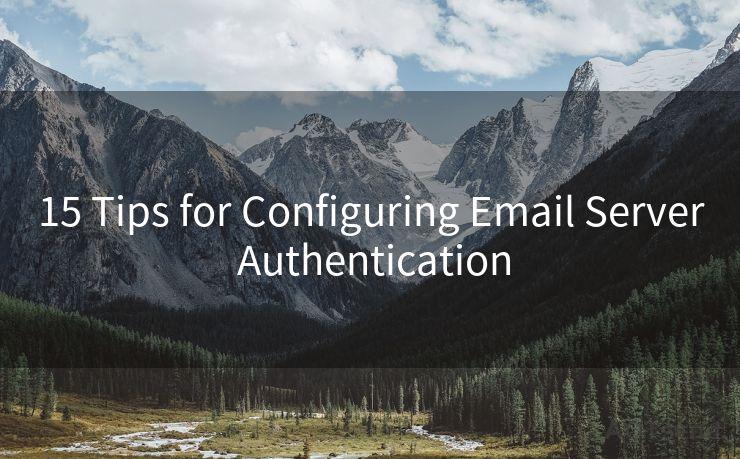15 Tips for Configuring Email Server Authentication




Email server authentication is crucial for securing your email communications and preventing unauthorized access. Here are 15 tips to help you configure email server authentication effectively:
1. Enable SSL/TLS Encryption
Ensure that your email server supports SSL/TLS encryption. This encrypts the data transmitted between the client and the server, protecting it from eavesdropping and tampering.
2. Use Strong Passwords
Enforce strong password policies for email accounts. This includes using a combination of uppercase, lowercase, numbers, and special characters. Regularly update these passwords to maintain security.
3. Implement Multi-Factor Authentication
For added security, consider implementing multi-factor authentication (MFA). This requires users to provide additional verification, such as a one-time password, beyond their regular credentials.
4. Restrict Access by IP Address
Configure your email server to restrict access based on IP addresses. This ensures that only authorized devices or networks can connect to the server.
5. Update Software Regularly
Keep your email server software up to date. Regular updates patch security vulnerabilities and improve the overall performance of your server.
6. Disable Unnecessary Services
Disable any unnecessary services or features on your email server. This reduces the attack surface and minimizes potential security risks.
7. Configure Firewall Rules
Set up firewall rules to block unauthorized access to your email server. Only allow incoming connections from trusted sources.
8. Monitor and Log Activity
Enable detailed logging and monitoring of email server activity. This helps detect any suspicious behavior or unauthorized access attempts.
9. Implement DKIM and SPF
Use DomainKeys Identified Mail (DKIM) and Sender Policy Framework (SPF) to authenticate outgoing emails. These technologies help prevent email spoofing and phishing attacks.

10. Use DMARC
Consider implementing DMARC (Domain-based Message Authentication, Reporting, and Conformance) to further enhance email authentication and reporting.
11. Secure Admin Access
Restrict and secure admin access to your email server. Use separate credentials for administrative tasks and ensure they are regularly updated.
12. Backup Regularly
Regularly backup your email server data to ensure data recovery in case of any unexpected events or disasters.
13. Train Users on Security Best Practices
🔔🔔🔔
【AOTsend Email API】:AOTsend is a Managed Email Service for sending transactional emails. Support Email Types: reminders, authentication, confirmations, notifications, verification codes, invoices, password resets, account activations, billing statements, two-factor authentication (2FA), and one-time passwords (OTP) emails, etc. $0.28 per 1000 Emails. 99% Delivery, 98% Inbox Rate.
You might be interested in:
Why did we start the AOTsend project, Brand Story?
What is a Managed Email API, How it Works?
Best 25+ Email Marketing Platforms (Authority,Keywords&Traffic Comparison)
Best 24+ Email Marketing Service (Price, Pros&Cons Comparison)
Email APIs vs SMTP: How they Works, Any Difference?
Educate your users on email security best practices, such as recognizing phishing emails and avoiding clicking on suspicious links or attachments.
14. Conduct Regular Security Audits
Perform periodic security audits to identify and address any vulnerabilities in your email server configuration.
15. Stay Informed about Security Threats
Keep yourself updated about the latest email security threats and vulnerabilities. This helps you stay proactive and adjust your security measures accordingly.
By following these 15 tips for configuring email server authentication, you can significantly enhance the security of your email communications and protect sensitive information from unauthorized access. Remember, email security is an ongoing process, and it's essential to stay vigilant and adapt to emerging threats.




Scan the QR code to access on your mobile device.
Copyright notice: This article is published by AotSend. Reproduction requires attribution.
Article Link:https://www.mailwot.com/p3890.html



